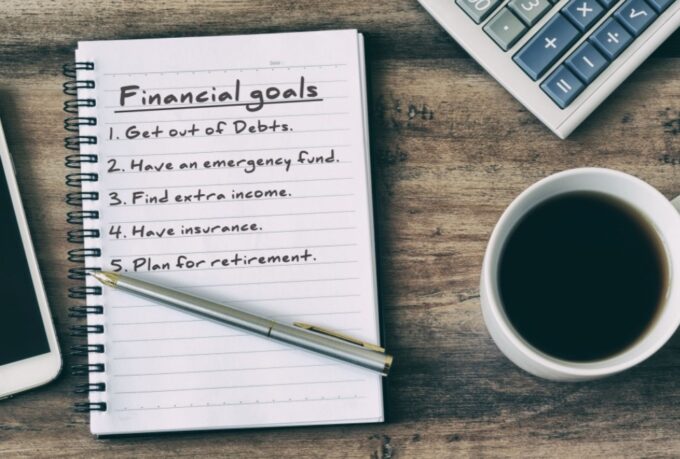Balancing work, families, household responsibilities, and personal relationships can take their toll, but have you been balancing your books? Your finances are an essential part of your everyday life and can significantly impact the quality of your professional and personal relationships.
When it comes to finances, many are struggling with at least one aspect, from budgeting to debt relief or long-term saving. Identifying and working towards solving these problems can have beneficial ripple effects in other areas of your life for years to come. Essentially, it’s about the foundation you lay and the habits you create.
Not sure where to begin? Take a look at our recommendations for balancing your books and taking the next step to financial freedom.
Understand Your Financial Goals

Before you start to look for solutions, it’s important to understand your current financial situation and your goals. Make a point to write or type out your goals, whether it’s retiring early or paying off a particularly high-interest credit card by a specific deadline.
The next step is to prioritize your goals because you likely have multiple ideas for your money. Then you can work your way down the list, so you’re not neglecting an important goal. When you have a clear picture of where you’re going, you can begin to choose the solution that works best for your situation.
Basic Budgeting

It may seem straightforward, but the reality is that many working professionals don’t have the proper tools to budget their finances effectively. Simple tools and resources can make all the difference and help create the building blocks for the years of saving and spending ahead of you.
The first step is to find the budgeting tool that makes sense for your lifestyle. If you’re an analytical, organized thinker, you may be able to get away with a manual excel sheet where you fill out your income and expenses each month. If you feel more comfortable with some assistance, budget apps have become a key resource and source of convenience for many.
They can be installed on any mobile device and can help you take your budget with you, tracking expenses, bill payments and more. When it comes to learning to budget, consistency and accountability are essential. When you take the time to notice how you’re spending and saving, you run a lower risk of overspending and accumulating debt.
Debt Relief

On the other hand, if you have accumulated debt over the months or years, there are still solutions to take advantage of to find relief. Typically, debt comes in the form of credit cards but can also include student loans. The longer you wait to pay off your debt, the more difficult it becomes to pay everything off and could lead to a troubling cycle.
There are steps you can take before you reach out for external assistance. For example, consider reaching out to your creditors and negotiating a lower interest rate. If you’re a long-term customer, they may be willing to lower your rate. If you can sell any items you no longer use or earn part-time income, these temporary solutions could help you find debt relief faster.
In more extreme cases, it’s okay to reach out to alternative lenders for help. Their services are designed to help borrowers consolidate their debt, leaving them with a single repayment plan to focus on rather than multiple creditors. Experts like Flexmoney.ca prioritize convenience and transparency rather than the red tape that can often come with traditional lenders.
Saving for the Future

Planning is a tool that can help you streamline nearly every aspect of your daily life and is especially important when it comes to your finances. Have you taken the time to think about what would happen to your current finances if an unexpected medical emergency occurred or if a pipe burst in your home and it needed immediate repair? That’s where the importance of an emergency fund comes into play.
Emergency funds are designed as a cushion for when life throws a curveball — and will help you tackle the problem without damaging your budget. Experts recommend saving at least six months of expenses. You should aim to take out a set percentage of your income each month and set it aside. If by chance, you never need to dip into this fund, then you can decide how to spend or invest the money.
Speaking of investing, you don’t have to be an expert in the stock market to take advantage of investment opportunities. Building long-term wealth can lead to significant returns and provide you with the extra income you may need later in life — whether you’re saving for a new home, your children’s education or any number of important life expenses.
There are various investing approaches you can take, depending on how long you’re looking to invest and the level of risk you can handle. With enough diversity and careful monitoring, you can successfully build more wealth.
Lastly, it’s never too early to think about retirement. One of the most important steps you can take to long-term financial freedom is to think ahead and save enough money so your future self can enjoy the years when you’re no longer making a steady income.
If your current employer offers matching contributions, that should act as your first incentive to start contributing as early as possible. It may seem like a long way away, but truthfully, every dollar you can set aside counts. Speak with your advisor about ensuring your retirement accounts are earning the highest possible interest rates so that while your money is sitting there, it’s also earning.
Conclusion
Balancing the books is all about precisely that, balance. It’s a careful dance between saving and spending and ensuring you’re keeping yourself out of debt. There is no one-size-fits-all solution for everyone, which is why it’s essential to explore your options and seek our expert advice when needed. When you have the tools in your belt, you can take the proper steps to repair your finances and ensure a solid financial future.










